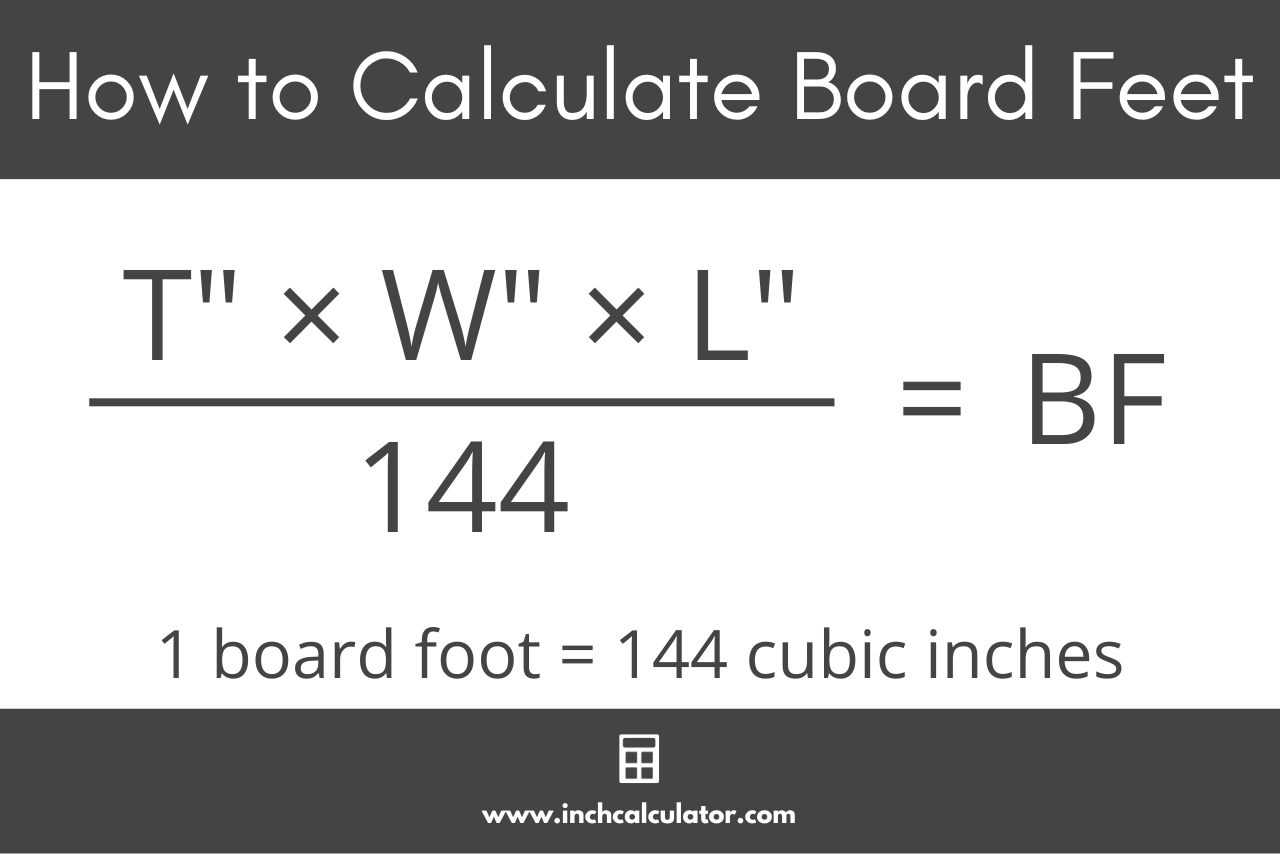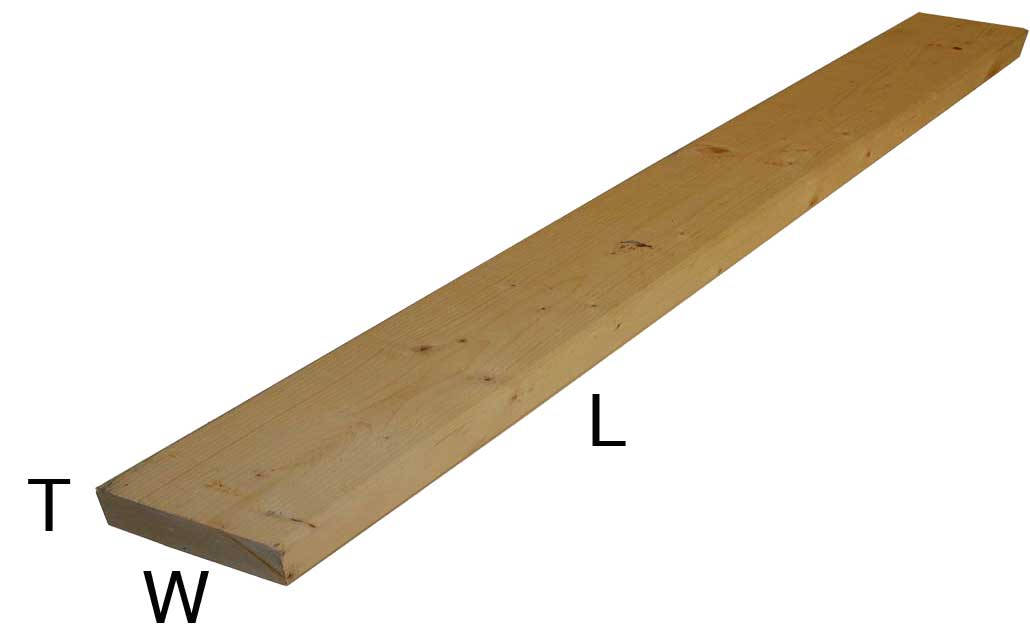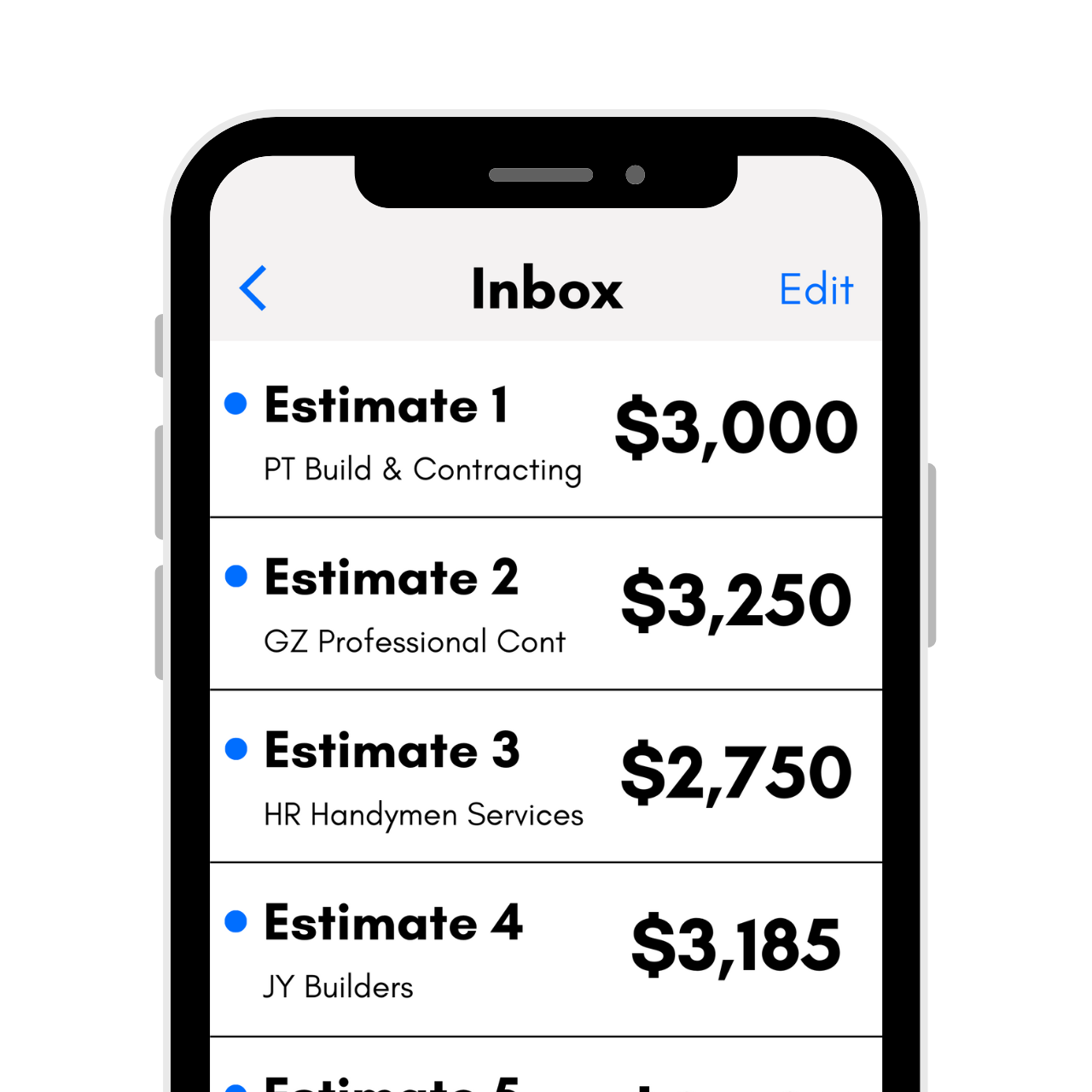Board Foot Calculator
Find the board footage of lumber by entering your boards’ length, width, and thickness. Add the price per board foot to estimate the cost.
Results:
Total Board Feet
Estimated Lumber Cost
On this page:
When it’s time to purchase lumber for a project, you may find that the material isn’t sold by the square foot or the linear foot, but by the board foot instead. This method of measuring wood is more accurate for sales and determining costs, even though it may not be a measurement that most lay people will use.
The calculator above will easily calculate the board footage and convert dimensions automatically. It will also help calculate the price of the board or the total lumber price for multiple boards.
This board foot calculator uses inches in decimal format or in quarters (e.g., 4/4). You can convert decimal measurements to fractions if you need the decimal equivalent for your dimensions.
What is a Board Foot?
A board foot, abbreviated bd ft, is a unit of measurement for the volume of a piece of wood in feet. While square feet refers to the area of a material on two dimensions and linear feet refers to the length of an area or material, board feet takes into account the total volume of the wood, including its length, width, and depth.
Large slabs of rough wood, hardwood lumber, and exotic woods are usually measured and priced by the board foot, which accounts for the thickness, width, and length of the lumber. This allows for more accurate sizing and cost across a broader range of materials.
One board foot is equal to 144 cubic inches and is equivalent to a 1-inch thick board that is 1 square foot in size. You may see the term board foot abbreviated to bd ft, BDFT, BF, or FBM(foot, board measure).
Board footage is used to quantify how much wood a board contains since length by itself is not enough to determine how much volume the lumber contains. Boards that are wider or thicker contain more wood.
For example, a board that is 4/4 × 4″ × 8′ has the same amount of wood as a board that is 4/4 × 8″ × 4′. The board footage measurement indicates that both boards are equal in size, while using just the length measurement might make the thinner board appear larger.
Unlike 2x4s and dimensional lumber, which are measured using nominal measurements, hardwood thickness is often measured in quarters of an inch, so you would refer to a 1″ board as four-quarters, expressed as 4/4.
How to Calculate Board Feet
You can calculate board footage, which is the volume of wood the board contains, using the calculator above or using a simple formula.

Using Length in Inches
You can calculate board feet by multiplying the board’s thickness in inches by the width in inches by the length in inches and then dividing the result by 144.
Thus, the formula to calculate board footage is (thickness × width × length) ÷ 144. Make sure you keep all measurements in inches, then divide by 144.
BF = Thickness [in] × Width [in] × Length [in] / 144

Using Length in Feet
You can also find the board footage of a board if your length dimension is in feet. Multiply the thickness of a board in inches by the width of the board in inches by the length of the board in feet, and then divide the result by 12.
BF = Thickness [in] × Width [in] × Length [ft] / 12
If you need help converting to inches, convert feet to inches, convert yards to inches, or convert centimeters to inches.
How to Calculate the Board Footage of a Log
There are a few methods that you can use to find the total lumber in a log, but the most common method is to use a Doyle log scale.[1]
To use a Doyle log scale, start by measuring the length of the log in feet and the smallest diameter of the log inside the bark in inches.
Then, refer to the Doyle log scale linked above to find the total number of board feet in the log.
There are several other commonly used scales for measuring logs and standing trees, including the International 1/4-inch scale and the Scribner standing tree scale.
Always use the same scale during one project in order to get consistent results. Switching between measurement scales may skew results and give inaccurate measurements.
Board Feet Charts
Refer to the charts below to quickly calculate the board feet for 4/4 and 8/4 stock.
4/4 Lumber (1″ Thick)
| 4′ L | 6′ L | 8′ L | 10′ L | 12′ L | 14′ L | |
|---|---|---|---|---|---|---|
| 4″ W | 1.33 BF | 2.0 BF | 2.67 BF | 3.33 BF | 4.0 BF | 4.67 BF |
| 6″ W | 2.0 BF | 3.0 BF | 4.0 BF | 5.0 BF | 6.0 BF | 7.0 BF |
| 8″ W | 2.67 BF | 4.0 BF | 5.33 BF | 6.67 BF | 8.0 BF | 9.33 BF |
| 10″ W | 3.33 BF | 5.0 BF | 6.67 BF | 8.33 BF | 10.0 BF | 11.67 BF |
| 12″ W | 4.0 BF | 6.0 BF | 8.0 BF | 10.0 BF | 12.0 BF | 14.0 BF |
8/4 Lumber (2″ Thick)
| 4′ L | 6′ L | 8′ L | 10′ L | 12′ L | 14′ L | |
|---|---|---|---|---|---|---|
| 4″ W | 2.67 BF | 4.0 BF | 5.33 BF | 6.67 BF | 8.0 BF | 9.33 BF |
| 6″ W | 4.0 BF | 6.0 BF | 8.0 BF | 10.0 BF | 12.0 BF | 14.0 BF |
| 8″ W | 5.33 BF | 8.0 BF | 10.67 BF | 13.33 BF | 16.0 BF | 18.67 BF |
| 10″ W | 6.67 BF | 10.0 BF | 13.33 BF | 16.67 BF | 20.0 BF | 23.33 BF |
| 12″ W | 8.0 BF | 12.0 BF | 16.0 BF | 20.0 BF | 24.0 BF | 28.0 BF |
Frequently Asked Questions
Why is lumber sold in board feet?
Board feet take the thickness of the wood into consideration, along with length and width. This gives a more accurate measurement of the total amount of wood and cost of the lumber.
What is the difference between board feet and linear feet?
Linear feet measure distance in one direction, or the length of an area in 12″ increments. Board feet measure the volume of the wood, including the thickness, length, and width, with one board foot measuring 1″ in thickness and 1 square foot in area.
How many board feet are in a 2x4x8?
The size of a 2″ x 4″ x 8′ is 5.34 board feet.
Why do wider boards cost more per board foot?
This is directly related to the board and type of wood. There are fewer wider boards per log than there are thinner logs, and some wood species have fewer wider logs in general, making wider logs a more scarce commodity, and therefore they have a higher cost.
References
- Nebraska Forest Service, Tree and Log Scale, https://nfs.unl.edu/documents/ruralforestry/tree%20and%20log%20scale%20Doyle%20WEB.pdf



